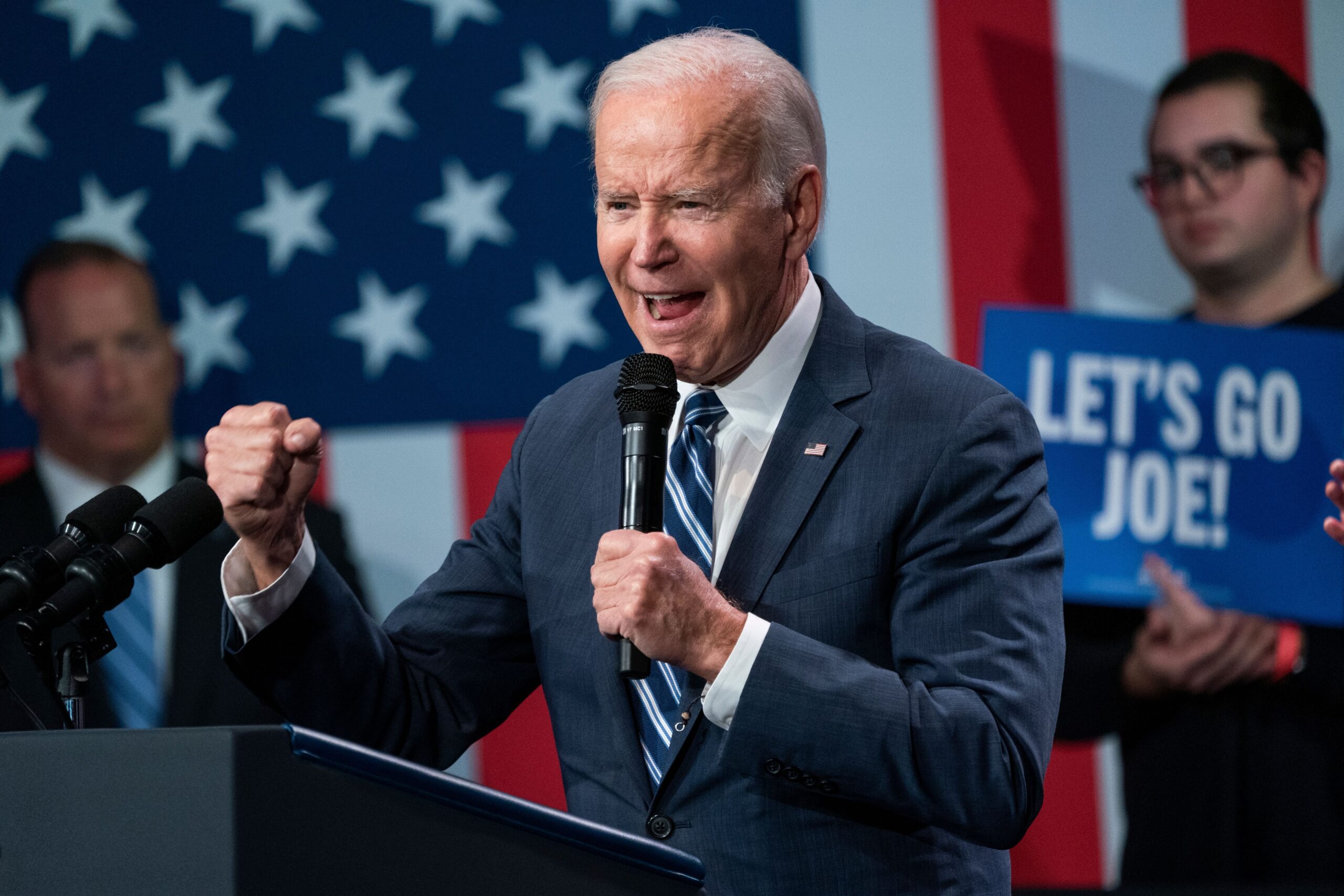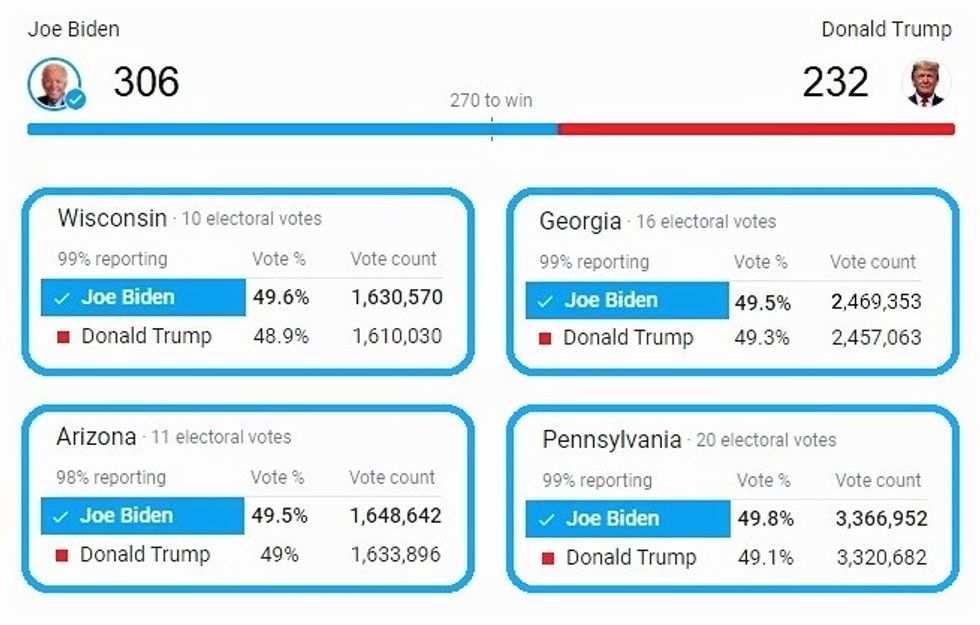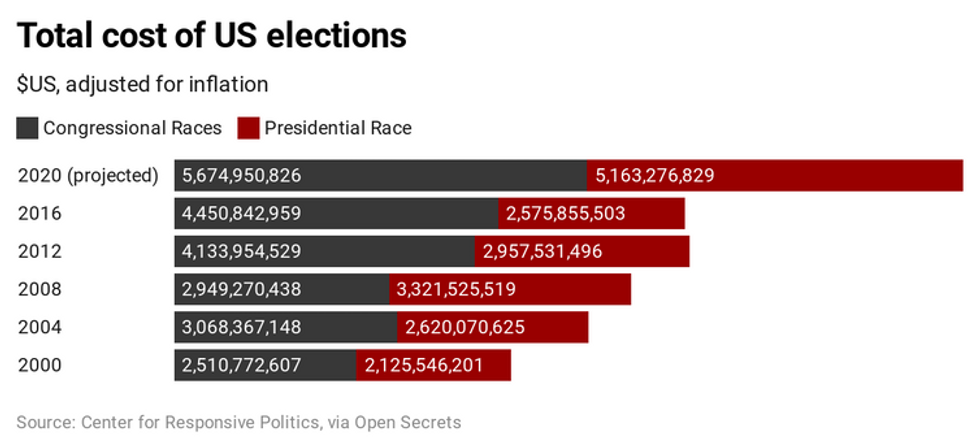
Photo by SHAWN THEW/EPA-EFE/Shutterstock
The panic that enveloped the world on November 3, 2020 already feels like a bad dream.
Despite the best efforts of Bernie Sanders and others to prepare us for the inevitable chaos, the partisan divide between mail-in and in-person voting had the predictable effect last Tuesday.
As the in-person votes accumulated in several key states where mail-in totals were always going to be delayed, the sense that Donald Trump was outperforming expectations—and was likely to secure reelection—was pervasive.
Sen. Bernie Sanders Predicts How Trump Will React On Election Nightwww.youtube.com
The president’s rhetoric—deriding mail-in voting and downplaying the threat of the deadly coronavirus pandemic—meant that his supporters were much more likely to turn out to polling places. Democratic voters, on the other hand, were more inclined to avoid the crowded public spaces of election day voting.
Considering the ongoing, unprecedented spike in COVID-19 cases in the US, that caution was well-placed. Nonetheless, it gave President Trump leeway to pretend that his apparent victory had somehow been tampered with.
That strategy may turn out to work, and Donald Trump could snatch a “legal” coup from the jaws of a clear electoral defeat. But if the election had been closer, this game would have been much easier for him to play. The uncertainty and the potential for a court case to disrupt the results—as happened in Florida in the 2000 election—could have taken over the country for weeks without any projected winner.
Instead, victory was declared for Joe Biden and Kamala Harris, and we got to experience the pristine beauty of Donald Trump’s desperate legal team scrambling to give a press conference outside Philadelphia’s Four Seasons…Total Landscaping.
The image of Rudy Giuliani spreading lies about fraudulent votes in front of a garage door in a random, grungy parking lot was priceless. The only thing better is the way he and his team unconvincingly pretended to have booked that spot—rather than the similarly-named luxury hotel—on purpose.
And that absurd, hilarious fumbling is all thanks to the fact that Joe Biden earned a resounding and unambiguous victory. Except… Did he?
The Election Results
At current count Joe Biden has received around 5 million more votes than Donald Trump, and that margin is likely to grow as millions of remaining votes are tallied.
His popular vote lead puts him roughly in line with Barack Obama’s unequivocal defeat of Mitt Romney in 2012. Biden is also projected to win as many as 306 electoral college votes—the same number Donald Trump won in 2016, and well in excess of the 270 needed to secure the presidency.
While these figures fall short of most of the polling in the lead-up to the election—which predicted Biden securing closer to an 8% lead—it still sounds like a decisive result. Sadly that shortfall hurt down-ballot Democrats, who failed to take control of the Senate or strengthen their caucus in the House. That points to at least two years of divided, ineffectual governance while Americans face down multiple generation-defining crises.
Still, the fears of a Trump victory that loomed large as the first results came in now seem a little silly. Trump didn’t really stand a chance, right?
Sadly, no. While the number of Americans who turned out to reject Trump’s hateful politics and failures of leadership outnumber their pro-Trump counterparts by a respectable margin, the growing sense that Biden’s victory was inevitable and comfortable does not hold up to scrutiny.
As 2016 taught us, “millions more votes” is a meaningless achievement in our bizarre, antiquated system. In that presidential race Hillary Clinton won the popular vote by nearly 3 million votes, but the way electoral votes are apportioned to favor rural states resulted in Donald Trump winning 306 electoral votes and the presidency (later finalized as 304 due to faithless electors).
The Decisive States
At the time, a great deal of attention was paid to the fact that three states—Wisconsin, Pennsylvania, and Michigan—had narrowly handed Trump his win. Worth a total of 46 electoral votes (enough to flip the whole election), Trump’s margin of victory in those states was less than 1%.
From a cohort of 138 million, 79,316 voters in those three states ended up making the decision for the entire country. It seemed like a slap in the face to the notion of Democratic elections. But it turns out that things were even more narrow in 2020.
While there are still votes being counted—and the specific figures could change as the final tallies come in—it looks likely that four states will go to Biden with a margin of less than 1%. And in the three states where counts are currently closest—Georgia, Arizona, and Wisconsin—Biden is ahead by a total of fewer than 50,000 votes.
If those three states had gone the other way—Arizona could still flip—Donald Trump would have secured their 37 electoral votes and been handed a second term as president. And that’s exactly what would have happened if 0.03% of the 160 million Americans who voted had decided to stay home—or if half that number flipped to voting for Trump instead of Biden.
 Projected final Electoral College Tally, with current vote counts in the four closest states.AP
Projected final Electoral College Tally, with current vote counts in the four closest states.AP
And Donald Trump only needs to assemble enough flimsy evidence to cast substantial doubt on that tiny fraction of votes in order to conduct a coup.
To put things in perspective, the voters who ensured Joe Biden’s victory are outnumbered by the average daily visitors to Disneyland (pre-COVID). Back in the ’90s, all the voters who were decisive in expelling Trump from the White House could have fit inside Donald Trump’s Atlantic City casinos—before those were all either shuttered or rebranded.
The number of voters who determined our leader during a pandemic are dwarfed by the number of people who have been killed by that pandemic in New York and Texas alone…
Even if you add Pennsylvania’s 20 electoral votes to the mix, around 95,000 voters could have delivered Donald Trump a comfortable victory—with 292 electoral votes—just by staying home. Then they all could have gone to a game at Penn State’s Beaver Stadium, with 10,000 seats left to spare.
The Problem With the Electoral College
Why is it possible—let alone familiar and expected—for the most powerful position on Earth, leading a nation of 330 million, to be assigned according to the will of a number of people who couldn’t fill the seats at a college football game?
Our system, as it currently exists, makes these razor-thin margins unavoidable.
If the decision were between two disappointing moderates, that might not be such a terrifying prospect, but political polarization has made each election an inevitable battle between a far-right zealot and… a disappointing moderate.
States with more rural populations lean strongly Republican, while more urban states lean strongly Democratic. With the already swift rate of cultural progress in cities being amplified by the Internet’s tendency to intensify everything, the backlash in rural areas that are more resistant to change is stark, and the divide is only growing.
Of course the populous in Democratic states significantly outnumber Republican states. In a democratic system that would mean that Republicans would have to shift their policies and their rhetoric to appeal to more people. But the electoral college cancels out the population difference—giving smaller states proportionally more sway.
As a result, Republicans can play more and more to their relatively small base of support, while Democrats attempt to build broad enough support to overcome their disadvantage. And this struggle ends up playing out in just a handful of “swing states” where opinions are fairly mixed.

That’s where candidates spend hundreds of millions of dollars, bombarding residents with attack ads, trying to sway the slim percentage of voters who aren’t devoted to one side or the other. And the effect is to leave an increasing number of people disgusted with the whole political process.
This makes it exceedingly easy for misinformation or voter suppression efforts to become decisive. What if Trump donor Louis DeJoy had been even better at slowing down the mail in the lead up to the election? What if a “satirical” deepfake video of Hunter Biden had spread on Facebook, bolstering false claims of pedophilia? Would it have been enough to shift the vote by 1% in Arizona, Georgia, and Wisconsin?
In either case, as awful and as stressful as this election was, we shouldn’t take the less-than-horrifying result as a sign that things are okay, or that the next election will be any better. As a nation we walk on a political knife’s edge that’s controlled by a fraction of the population of a few states.
The National Popular Vote Interstate Compact: A Possible Solution
If you don’t live in one of those battleground states, you will never be in that tiny group of voters whose decision to vote or stay home determines the next four years for the rest of America. As long as we continue to allow the confusing, undemocratic, and unpopular Electoral College system to determine the outcome of presidential elections, candidates will ignore the needs of your state, because your vote won’t count.
The good news is: There is a way out that doesn’t avoids the nearly impossible process of passing a constitutional amendment.
The Electoral College and the National Popular Vote | One Detroit Clipwww.youtube.com
States have the power to determine how their electoral votes are awarded. If a few more state legislatures in places like Texas—where each vote has roughly ⅓ the power of a vote in Vermont—signed onto the National Popular Vote Interstate Compact, we could render the Electoral college moot.
A winning number of electoral votes would go to whoever won the popular vote. Our next president would be determined by millions of Americans, rather than a few thousand people in Wisconsin.
Until then, we will keep walking the razor’s edge.
- We Need to Be Prepared to Act If Trump Tries to Steal the Election … ›
- Kanye believes the cure to the coronavirus is prayer and not vaccines ›
- 3 Ways to Cope with Election Stress – Popdust ›
- Joe Biden Won the Presidency—How Do We Get Rid of Trump … ›
- What You Can Do If Trump Tries to Steal the Election – Popdust ›













